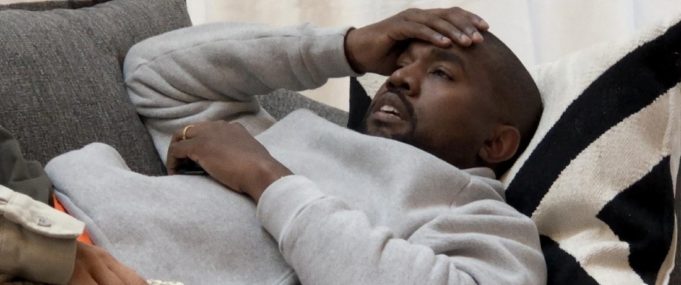We’re six years and counting into the Kanye West mental meltdown, and still the most perceptive thing anybody has said about it was on Saturday Night Live in 2019. Pete Davidson, a man who knows a thing or two about dealing with mental health in the public eye, addressed it thus:
However, Nico Ballesteros was documenting Ye’s life from 2019 on, so he got a ringside seat for the legendary rapper’s tirades aimed at anyone around him, and now all that is in In Whose Name?, possibly the most alarming documentary you’ll see all year. It’s true that many filmmakers could have made something compelling out of this footage, but Ballesteros (who was a teenager when he started filming this) deserves the credit for being there and for documenting the chaos that makes a great case that Kanye needs to be involuntarily committed.
The movie begins with a prologue of footage documenting West’s life up to 2017, where he hangs out with his celebrity friends like Drake and Diddy. (I’ll reserve my comments about that for another time.) The story begins in earnest when he goes off his medications. The infamous moment when Yeezy wore a MAGA hat on SNL and endorsed Trump’s presidency comes early on here, and we see the fallout: Chris Rock commends his courage, but Michael Che confronts him about calling NBC’s employees slaves when they couldn’t respond: “I’m a fan! I look up to you. Why would you do me like that? That was foul.”
A common theme in West’s rants is that people in general (and his fellow Black folks in particular) are being mind-controlled by the mainstream media and other forces in society. Well, going off his pills has given him control of his own life the way Maggie Simpson is controlling the family car with her plastic steering wheel. His bipolar disorder is calling the tune, and it is making him do quite the dance. Despite putting out a statement saying he’s leaving politics behind to concentrate on his music, Yeezus nevertheless announces his presidential run, saying that Trump is a mere harbinger of the glory that is Ye. He also launches a new clothing line with The Gap and breaks ground on schools in Uganda, a house near Flagstaff, Ariz., and a megachurch in Wyoming. David Letterman asks him when he’ll ever know the church is finished if he keeps tinkering with the architecture, and West says he’ll know the church is done because world peace will break out. (Ye wound up selling the Wyoming property later on.)
You probably shouldn’t laugh at people who need help as transparently as this, but I’m sorry. When he talks to an architecture firm in Switzerland and compares himself favorably to Picasso, it’s beyond my ability to hold back. Some of his flunkies are chuckling in the background (probably at something unrelated) while he’s working on his Donda album, and the megalomaniacal West screams at them, calling himself “the most influential artist in human history.” He is not joking, but a good portion of the crowd will laugh anyway.
I would probably find all this much less funny if I were married to the man. One of the surprises here is how Kim Kardashian emerges as a voice of reason here. She isn’t pleased by the SNL speech and tells her husband over the phone that he has called her a slave too. She tells him that acting this way will make him lose all his money, to which he screams, “Don’t tell me I’m gonna end up with nothing! Don’t put that out in the universe!” The movie also shows him yelling in her face on some occasions (and in Kris Jenner’s when she tells him to take his meds), and Kim rationally points out that she doesn’t act this way when people in her business ventures tell her no. To think, when they got married, I thought he could do better. Oh, how wrong I was.
Seeing all this made me think about the times when I went off my anti-depressants (not by my choice, and to be clear, I have anxiety disorder and not bipolar disorder). I was never this bad off my meds, but then, I’ve never been acclaimed as the world’s greatest rapper, either. Maybe if I had, and I had all the Grammy awards and cash and devoted fanbase that came with that, I’d be like this off my pills. Ye loses his deal with The Gap when he demands that his designers print the words “White Lives Matter” on all the garments, and the day after he makes anti-Jewish comments and dares Adidas to drop him, that’s exactly what the shoe company does. Ordinarily, I would say that when a shoe company founded by actual Nazis thinks you’re anti-Semitic, you need to look at yourself in the mirror. That, however, would do no good in this case, because when West looks in a mirror, he sees a messiah. Messiahs never do anything wrong, and every idea they have is a good idea, which is maybe why I’ve never had much use for them.
Ballesteros might have profitably asked some psychiatric experts about the nature of bipolar disorder, or about Black men being more reluctant to seek mental help than other people and how much it’s playing into what we’re seeing. Still, the footage here is of value just on its own. In that prologue, Pharrell Williams compares Kanye to Michael Jackson as a musician, and the comparison is more apt than he knows. After all, the King of Pop was clearly and seriously mentally ill in his later years, and never received the help he needed because he had too much money and surrounded himself with people who were financially invested in the madness continuing. That’s the place where this movie finds West (we see Candace Owens and the late Charlie Kirk egging on his right-wing tantrums), and all the musical talent in the world won’t free him from that. He has the power to leave, but he thinks he’s on top of a mountain. The rest of us can see he’s in a hole.
In Whose Name?
Starring Ye. Directed by Nico Ballesteros. Not rated.












